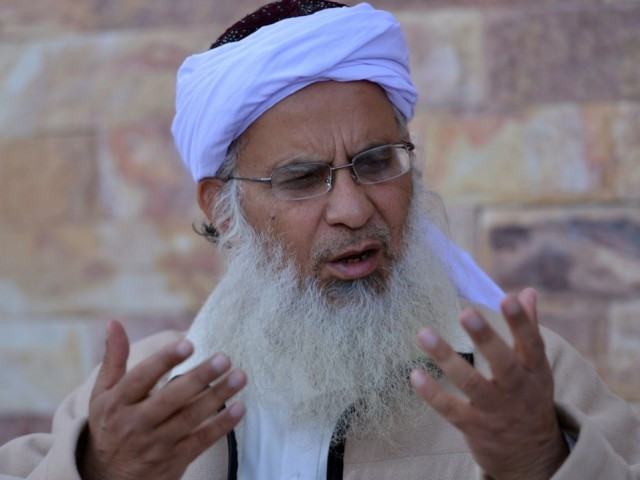Court’s order: Arrest warrants issued for Lal Masjid cleric
Maulana Aziz still at large, police say application to include anti-terrorism clauses to FIR in process

Senior Civil Judge Saqib Jawad issued the non-bailable arrest warrant after Aabpara police sought the arrest of Aziz in response to an FIR lodged under Section 506 (II) of the Pakistan Penal Code (PPC) for criminal intimidation.
In the aftermath of the deadly attack on APS in Peshawar, civil society activists had gathered outside Lal Masjid last week to protest against the statement by the cleric in which he refused to condemn the attack.

However, the capital police seem reluctant to arrest Aziz despite arrest warrants against him. Interior ministry had earlier withdrawn the official security from the cleric — which he has been enjoying for long.
Aabpara Police Station House Officer (SHO) Khalid Awan confirmed that police has not arrested Aziz and claimed that anti-terrorism charges will be added in the FIR and legal branch of the police is already working on it.
“Police is bound to arrest the suspect in 30 days after issuance of non-bailable arrest warrants and we have time to arrest him,” said Awan.
Following the 2007 military operation, a number of cases were registered against the cleric and his slain brother with charges ranging from kidnapping, treason, and terrorism - including a Ranger’s murder case against Aziz.
Activists press for Aziz’s arrest
Hundreds of civil society activists gathered in front of Aabpara Police Station to demand arrest of Abdul Aziz. The activists held placards reading “reclaim your mosque” slogans and lit candles in memory of the Peshawar attack victims.
The activists also presented a charter of demands, demanding zero tolerance for extremists and terrorists. Other demands included strict enforcement of the Pakistan Electronic Media Regulatory Authority’s code of conduct; no air time for any terror outfit or their apologists; action against online forums promoting religious extremism and hatred; and monitoring of sermons in all mosques and seminaries. The participants also called for action against the banned outfits, and madrassa reforms
Published in The Express Tribune, December 27th, 2014.



















COMMENTS
Comments are moderated and generally will be posted if they are on-topic and not abusive.
For more information, please see our Comments FAQ